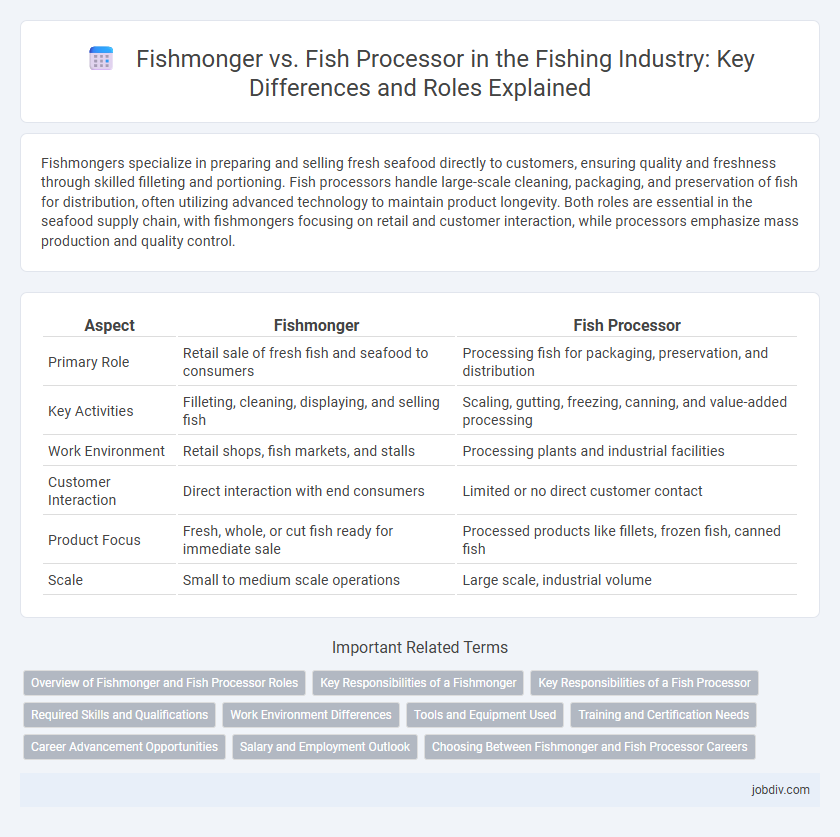Fishmongers specialize in preparing and selling fresh seafood directly to customers, ensuring quality and freshness through skilled filleting and portioning. Fish processors handle large-scale cleaning, packaging, and preservation of fish for distribution, often utilizing advanced technology to maintain product longevity. Both roles are essential in the seafood supply chain, with fishmongers focusing on retail and customer interaction, while processors emphasize mass production and quality control.
Table of Comparison
| Aspect | Fishmonger | Fish Processor |
|---|---|---|
| Primary Role | Retail sale of fresh fish and seafood to consumers | Processing fish for packaging, preservation, and distribution |
| Key Activities | Filleting, cleaning, displaying, and selling fish | Scaling, gutting, freezing, canning, and value-added processing |
| Work Environment | Retail shops, fish markets, and stalls | Processing plants and industrial facilities |
| Customer Interaction | Direct interaction with end consumers | Limited or no direct customer contact |
| Product Focus | Fresh, whole, or cut fish ready for immediate sale | Processed products like fillets, frozen fish, canned fish |
| Scale | Small to medium scale operations | Large scale, industrial volume |
Overview of Fishmonger and Fish Processor Roles
Fishmongers specialize in the retail preparation and sale of fresh fish, focusing on customer service, filleting, and maintaining seafood quality for direct consumer purchase. Fish processors handle the industrial-scale processing of fish, including cleaning, freezing, packaging, and preparing seafood products for wholesale distribution. The fishmonger's role centers on retail expertise and fresh product presentation, while fish processors concentrate on large-scale production efficiency and food safety compliance.
Key Responsibilities of a Fishmonger
A fishmonger specializes in selecting, cleaning, filleting, and displaying fresh fish and seafood for retail sale, ensuring product quality and customer satisfaction. They possess knowledge of various fish species, proper storage techniques, and food safety regulations to maintain freshness and prevent spoilage. Fishmongers also provide expert advice to customers on fish preparation and cooking methods, enhancing the overall shopping experience.
Key Responsibilities of a Fish Processor
A fish processor is responsible for cleaning, filleting, and packaging fish to ensure product quality and safety for consumers. They monitor temperature controls and adhere to strict hygiene standards to prevent contamination and maintain freshness. Fish processors also handle inventory management and coordinate with suppliers to ensure a consistent supply of raw fish.
Required Skills and Qualifications
Fishmongers require in-depth knowledge of various fish species, excellent knife skills for filleting and portioning, and strong customer service abilities to advise and assist buyers. Fish processors need to be skilled in operating specialized machinery, understand food safety regulations, and maintain quality control during the preparation and packaging stages. Both roles demand attention to detail, physical stamina, and a commitment to hygiene standards within the seafood industry.
Work Environment Differences
Fishmongers typically work in retail environments such as markets or seafood shops, where they handle fresh fish by cleaning, filleting, and preparing it for customer purchase. Fish processors operate in industrial settings like processing plants or factories, focusing on mass production tasks including freezing, packaging, and quality control. The fishmonger's work environment emphasizes direct customer interaction and skilled craftsmanship, while fish processors engage in repetitive, large-scale operations with stringent hygiene and safety standards.
Tools and Equipment Used
Fishmongers primarily utilize knives such as fillet, boning, and scaling knives, alongside cutting boards and fish cleaning tables designed for preparing and displaying fresh fish. Fish processors rely on industrial equipment like automated filleting machines, vacuum sealers, and large-scale washing tanks to handle high-volume fish processing efficiently. The tools used by fish processors emphasize speed and hygiene, while fishmongers focus on precision and presentation.
Training and Certification Needs
Fishmongers require specialized training in fish handling, cutting techniques, and customer service, often supported by certifications such as seafood HACCP (Hazard Analysis Critical Control Point) to ensure food safety compliance. Fish processors undergo rigorous training focused on industrial-scale fish processing, including quality control, machinery operation, and adherence to regulatory standards, typically validated by certifications from food safety authorities like the FDA or equivalent bodies. Both roles demand continuous education in seafood hygiene and sustainability practices, but fish processors generally face higher certification requirements due to the complexity and scale of processing operations.
Career Advancement Opportunities
A fishmonger typically gains career advancement by developing expertise in selecting, preparing, and selling fresh seafood, potentially moving into retail management or specialty seafood markets. Fish processors have opportunities to advance through roles in quality control, production supervision, and food safety compliance within larger processing plants or seafood companies. Both careers offer pathways into related industries such as supply chain management and product development, with fish processing careers often providing more technical and industrial growth options.
Salary and Employment Outlook
Fishmongers typically earn an average salary ranging from $25,000 to $40,000 annually, with job opportunities concentrated in retail markets and seafood shops. Fish processors earn between $27,000 and $45,000 per year, often employed in seafood factories and processing plants with a steady demand driven by the food industry's supply chain needs. Employment outlook for both roles varies by region, with fish processors experiencing slightly higher growth due to increasing global seafood consumption and processing automation.
Choosing Between Fishmonger and Fish Processor Careers
Choosing between a fishmonger and a fish processor career depends on your interest in direct customer interaction or industrial-scale seafood handling. Fishmongers specialize in selecting, preparing, and selling fresh fish at markets or retail stores, requiring skills in customer service and product knowledge. Fish processors work in factories, focusing on cleaning, filleting, and packaging fish for distribution, emphasizing efficiency, quality control, and food safety standards.
Fishmonger vs Fish Processor Infographic

 jobdiv.com
jobdiv.com